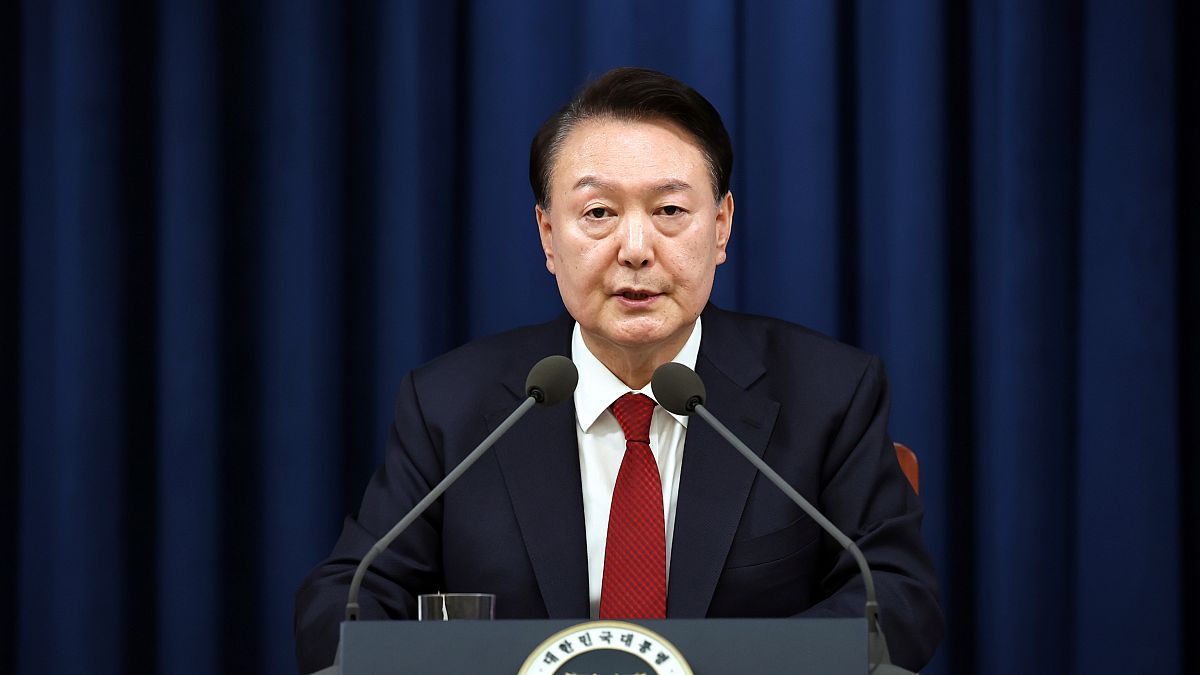South Korean president faces life in prison if found guilty of treason

South Korea’s opposition has initiated impeachment proceedings against President Yoon Suk-yeol over his martial law declaration. If impeached, he could face trial for high treason.
South Korea’s President Yoon Suk-yeol has replaced Defence Minister Kim Yong-hyun amid efforts by opposition parties to impeach both men for briefly imposing martial law this week — a move that was overturned by parliament.
Kim offered his resignation and apologised for the disruption and concern caused to the public by the incident, admitting that troops acted under his orders and taking full responsibility.
Yoon announced on Thursday that Kim will be replaced by retired General Choi Byung-hyuk, currently South Korea’s ambassador to Saudi Arabia. Vice Defence Minister Kim Seon-ho will serve as acting minister until Choi assumes the role after a parliamentary hearing.
The hearing is largely symbolic, as the president can appoint ministers without requiring parliamentary approval.
A joint motion to impeach Yoon has been submitted to the National Assembly and will be voted on this Saturday evening. Meanwhile, in the wake of the martial law incident, large crowds gathered outside the parliament for a candlelit vigil in protest against the president.
Yoon, who faces potential prosecution for high treason, has not appeared in public since announcing the lifting of martial law on television.
Opposition lawmakers also voted on Thursday to impeach the chairman of South Korea’s auditing board and three senior prosecutors. The prosecutors are accused of watering down an investigation into suspected stock manipulation involving Yoon’s wife.
Reactions from neighbours
Reactions from neighbouring countries to developments in South Korea have been varied. Chinese Foreign Minister Wang Yi declined to comment, saying that the situation was Seoul’s “domestic affair”.
On the other hand, the Japanese government said it was closely monitoring the situation in Seoul with serious concern.
Chief South Korean Cabinet Secretary Hayashi Yoshimasa told reporters on Thursday that Japan and South Korea are important neighbours who should cooperate on global challenges.
“The government will make appropriate decisions on the countries’ comprehensive bilateral relations,” Hayashi added.
Yoon’s declaration of martial law came just hours after his summit with Kyrgyzstan President Sadyr Japarov, who was in Seoul for an official visit. Meanwhile, Swedish Prime Minister Ulf Kristersson reportedly cancelled his planned trip to South Korea this week.
Amid worries over the implications of Yoon’s martial law decrlaration for South Korea’s democracy, officials have been trying to mitigate backlash.
Foreign Ministry spokesperson Lee Jaewoong said the ministry sent diplomatic notes to foreign missions stressing that martial law was lifted according to democratic procedures and that travel advisories need not change as public safety remains stable.
How do the numbers play out?
Impeaching the president would require the support of at least 200 members in South Korea’s 300-seat National Assembly, a two-thirds majority.
The opposition parties currently hold 192 seats and would need backing from 18 lawmakers within Yoon’s party. However, while members of the party’s anti-Yoon faction, have labelled his declaration of martial law “unconstitutional”, they have also stated they will oppose impeachment.
Should the impeachment proceed, Yoon will be suspended from office while the Constitutional Court decides whether to remove him permanently.
The impeachment motion accuses Yoon of failing to meet the constitutional conditions for declaring martial law, which is restricted to wartime or similarly severe crises.
It claims he attempted a “self-coup” by mobilising the military, suspending political party activities, and using troops to block access to the National Assembly — actions deemed tantamount to rebellion.
However, since the Korean War has never officially ended, Yoon might argue that South Korea remains in a state of war, thus providing a legal basis for his actions.
High treason is punishable by death under South Korean law. However, while the death penalty remains legal, no executions have been carried out in the country since 1997.









